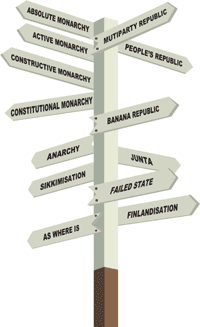 A brief recap of the story so far:
A brief recap of the story so far: . The political parties made a mockery of their mandate and frittered away the gains of 1990.
. The royal massacre struck a blow to the national psyche and the country is only now coming to terms with its implications.
. Feckless democrats found themselves incapable of dealing with the savage tenacity of the Maoists.
. Never happy with 1990, the royal right used the disarray to stage October Fourth.
. After messing around initially, the parties got their act together and forged an alliance to fight that retrogressive royal step.
. There is now blood flowing not just in Bhojpur and Beni but also from heads of protestors on the streets of the capital.
. Under pressure to make a face-saving backtrack, King Gyanendra moots elections in Pokhara.
. Defiant parties say nothing doing, Your Majesty, reinstate parliament otherwise we will unleash our student wing.
Things can't stay in this state of disequilibrium for long, something has to give. Someone with vision and statesmanship has to step in to set the country back on the rails. In our polity, that person should have been the head of state. But the monarch is mired in controversy and has lowered himself down to the level of other political players.
We have come to similar crossroads in our country's history before, but none as critical and with such far-reaching consequences as this one. Maybe it was wishful thinking to hope, as we did in this space last week, that sanity would prevail and we would have a ceasefire in the new year.
Nepalis are asking the political parties on the streets: is your agitation going to bring us anywhere nearer to a resolution to the conflict? They are asking the king: why are you letting this drag on? And they ask the Maoists: haven't you done enough harm already?
So, as the country drifts from a tripartite power struggle to a bipolar confrontation between democracy and anti-democracy, the people may be forced to chose a multiparty republic as the least of all evils. Indeed, the slogans on the streets are superceding Maoist graffiti in is radical content.
The differences between the constitutional forces are relatively minor, they should be easily resolved with an interim team acceptable to all political parties and the king, and which can be entrusted with the task of holding elections for a new parliament to debate sweeping constitutional changes.
This crisis provides us a chance to make a breakthrough in nation-building and devise a more inclusive polity. After the sacrifice of 10,000 Nepali lives, it is now possible to attain that objective without further bloodshed.


